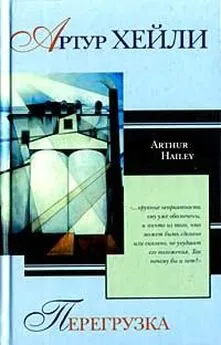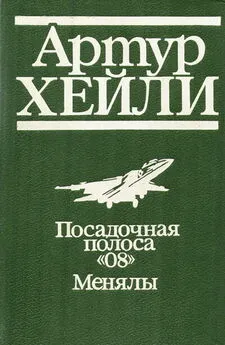Артур Хейли - Аэропорт / Аirport
- Название:Аэропорт / Аirport
- Автор:
- Жанр:
- Издательство:неизвестно
- Год:2020
- Город:Москва
- ISBN:978-5-17-121013-7
- Рейтинг:
- Избранное:Добавить в избранное
-
Отзывы:
-
Ваша оценка:
Артур Хейли - Аэропорт / Аirport краткое содержание
Для удобства читателя текст сопровождается комментариями и кратким словарем.
Предназначается для продолжающих изучать английский язык (уровень 4 – Upper-Intermediate).
Аэропорт / Аirport - читать онлайн бесплатно ознакомительный отрывок
Интервал:
Закладка:
Wayne Tevis leaned forward. “Lee will take over, Keith.” He motioned to another controller who had just returned from his own work break—a scheduled one.
Keith nodded, though he remained in place and continued to give radio instructions to aircraft while the new man got the picture. It usually took several minutes for one controller to hand over to another. The man coming in had to study the radar display, letting the over-all situation build in his mind.
Coupled with tense mental sharpness was another requirement—a controlled, studied calmness at all times on duty. The two requirements—contradictory in terms of human nature—were exhausting mentally.
“Okay,” the new man said, “I have the picture.”
Keith slid out from his seat, disconnecting his headset as the controller took his place.
The tower chief told Keith, “Your brother said he might drop around later,”
Keith nodded as he left the radar room.
Air traffic emergencies of one kind or another occurred several times a day at Lincoln International, as they did at any major airport. Category one was the most serious, but was rarely invoked, since it signaled an actual crash. Category two was notification of imminent danger to life, or physical damage. Category three, as now, was a general warning to airport emergency facilities to stand by; they might be needed, or they might not. For controllers, however, any type of emergency involved additional pressures and aftereffects.
Keith entered the controllers’ locker room which adjoined the radar control room. The small cubicle with a single window had three walls of metal lockers, and a wooden bench down the center. No one else was in the locker room, and Keith reached for the light switch and turned it off. Enough light came in through the window for him to see.
Then, opening his locker, he took out the lunch which Natalie had packed before his departure from home this afternoon. As he poured coffee from a Thermos, he wondered if Natalie had put a note in with his meal, or, if not a note, some item she had clipped from a newspaper or a magazine. She often did one of both, hoping, he supposed, that it might cheer him. She had worked hard at doing that, right from the beginning of his trouble.
More recently, however, there had been fewer notes and clippings. Perhaps Natalie, too, had finally lost heart.
A picture of Natalie was taped to the inside of his locker door. He had brought it here three years ago. The picture showed Natalie in a bikini. She was seated on a rock, laughing, one slim hand held above her eyes to shield them from the sun. Her light brown hair streamed behind; her small face showed the freckles which always appeared in summer. They had been on a motoring holiday in Canada, and for once their children, Brian and Theo, had been left behind in Illinois, with Mel and Cindy. The holiday proved to be one of the happier times that Keith and Natalie had ever known.
Perhaps, Keith thought, it wasn’t a bad thing to be remembering it tonight.
Pushed in behind the photo was a folded paper. It was one of the notes he had been thinking about, which Natalie put occasionally in his lunch pail. This clipping was about continuing experiments, by U.S. geneticists. Human sperm, it reported, could now be fast frozen and stored indefinitely. When thawed, it could be used for fertilization of women at any time.
Natalie had written:
It appears you can have babies merely by opening a refrigerator door.
I’m glad we had our ration
With love and passion.
She had been trying then; still trying desperately to return their lives… the two of them; and as a family… to the way they had been before.
Mel had joined forces, too, attempting with Natalie, to induce his brother to fight free from the depression which engulfed him totally.
Even then a part of Keith had wanted to respond, to respond to love with love himself. But the effort failed, because there was no feeling or emotion left within himself, only remorse and despair.
Keith wondered again if Natalie had put in a note with his meal tonight, hoping that she had. There were ham and sandwiches, a container of cottage cheese, a pear, and wrapping paper. Nothing more.
It was his own fault; there had been no time. Today, because of the preparations he needed to make, he had left home earlier than usual. She had not asked why he wanted to leave early. If there had been questions, he would have had to invent something, and he would not have wanted the last words between them to have been a lie.
He had driven to the airport business area and registered at the O’Hagan Inn where, earlier in the day, he had made a reservation by telephone. In a few hours from now, when Keith’s duty watch was ended, he could go there quickly. The room key was in his pocket.
10
The meeting of Meadowood citizenry started later than planned, since most of the six hundred adults who were present had had to battle their way, in cars and on foot, through deep snow. But somehow they came and were unanimously angry.
First they were angry with the thunderous noise of jet propulsion. The second reason was that those assembled had been unable to hear one another so far.
Some difficulty in hearing had been anticipated, and a portable p.a. system had been borrowed from the church. What had not been expected, however, was that tonight jet aircraft would be taking off immediately overhead.
In a momentary silence the chairman, a balding man named Floyd Zanetta, who was a printing firm manager, shouted, “Ladies and gentlemen, for years we have tried reasoning with the airport management and the airline companies. What do the airport and airlines do? I’ll tell you. They pretend to listen. And they make promises, but they are only liars…”
The word “liars” was lost in an unbelievable crescendo of sound. A few glanced upward nervously.
The roar lessened and faded. Already miles away and several thousand feet above, Flight 58 of Pan American was climbing through storm and darkness, reaching for higher, clearer altitudes. Other flights, already in line on an adjoining taxiway, were waiting their turn to follow.
Zanetta continued hastily, “I said they are liars…”
“Mr. Chairman,” a woman’s voice cut in from the body of the hall, “going over it again won’t change anything. What can we do ?”
Zanetta said irritably, “If you’ll kindly let me finish…”
He never did. Once again, the same encompassing roar dominated the Sunday school hall.
Then Zanetta continued speaking…
Elliott Freemantle, a lawyer seated beside Zanetta, fidgeted. He re-crossed his legs, observing his two-hundred dollar alligator shoes. Elliott Freemantle had long ago discovered that people preferred their lawyers—unlike their doctors—to look prosperous. Prosperity in a lawyer conveyed an aura of success.
Freemantle had read about the community’s problem and promptly arranged, through contacts, to have his name suggested to several homeowners as the one lawyer who could most likely help them. As a result, a homeowners committee eventually approached him. Meanwhile, he had made a superficial study of the law, and recent court decisions, affecting noise and privacy – a subject entirely new to him – but when the committee arrived, he addressed them with the assurance of a lifetime expert. Later, he had made the proposition which resulted in this meeting tonight, and his own attendance.
Zanetta, the chairman, was saying, “…and so it is my privilege and pleasure to present…”
Elliott Freemantle bounded to his feet. “If you are expecting sympathy from me, you can leave right now, because there won’t be any. My business is law and nothing else.”
He had deliberately made his voice harsh. He had also seen the newspaper reporters look up and pay attention. Good! Cooperation with the press ranked high in any project of Elliott Freemantle’s.
“If we decide, between us, that I am to represent you, it will be necessary for me to ask you questions about the effect of airport noise on your homes, your own physical and mental health. But you may as well know that whatever I learn, and however deeply I become involved, I don’t lose sleep about the welfare of my clients when I’m away from my office or the courts. But…” Freemantle paused dramatically. “But, in my office and in the courts, if we work together, I promise you will be glad I am on your side and not against you.”
Elliott Freemantle sensed early that these people were weary of sympathy. His own words, blunt and brutal, were like a cold, refreshing douche. Now, the moment for specifics had arrived—tonight, for this group, a discourse on the law of noise.
The law of noise, he declared, was increasingly under study by the nation’s courts. Old concepts were changing. New court decisions were establishing that excessive noise could be an invasion of privacy. Courts were in a mood to grant financial recompense where intrusion could be proven.
The United States Supreme Court, he went on, had already set a precedent, and he described the precedent in detail. He then added that elsewhere, more and more similar cases were being argued in the courts. Mention of a specific sum—ten thousand dollars—evoked immediate interest, as Elliott Freemantle intended that it should.
The entire presentation sounded authoritative, factual, and the product of years of study. Only Freemantle himself knew that his “facts” were the result of two hours, the previous afternoon, spent studying newsclippings.
The only thing that Freemantle wanted was this Meadowood homeowners group as clients—at a whopping fee.
It was remarkable what you could accomplish with audacity, particularly when people were white hot in pursuing their own interests. An ample supply of printed retainer forms was in his bag.
“There is little time. Legal action should be begun at once, before the airport, by perpetuation of noise over a period of years, could claim custom and usage.”
Near the front of the audience, a youngish man in hopsack slacks sprang to his feet. “By God!—tell us how we start.”
“You start—if you want to—by retaining me as your legal counsel.”
It had worked, as Elliott Freemantle had known it would.
He would give them value for their money—a good show, with fireworks, in court and elsewhere. Now that his own involvement was assured, he wanted to cement the relationship by staging the first act of a drama.
The actors in the drama would be the residents of Meadowood, here assembled.
The scene would be the airport.
The time: tonight.
11
At approximately the same time D. O. Guerrero was surrendering to failure.
D. O. Guerrero was a gaunt man, slightly stoop-shouldered, with a protruding, narrow jaw, deep-set eyes, pale thin lips, and a slight sandy mustache. His age was fifty; he looked several years older.
He had been married for eighteen years. By some standards, the marriage was good. But in the past year, a mental gulf had opened between the Guerreros which Inez, though she tried, was unable to bridge. It was one result of a series of business disasters which reduced them to near poverty, and eventually forced a succession of moves, including the one to this drafty, cockroach-infested, two-room apartment.
A few weeks ago, in a rage, he had struck Inez. She feared more violence and, soon after, sent their two teen-age children to stay with her married sister in Cleveland. Inez herself stayed on, taking a job as a coffee-house waitress, and the work at least provided money for food.
Читать дальшеИнтервал:
Закладка:










